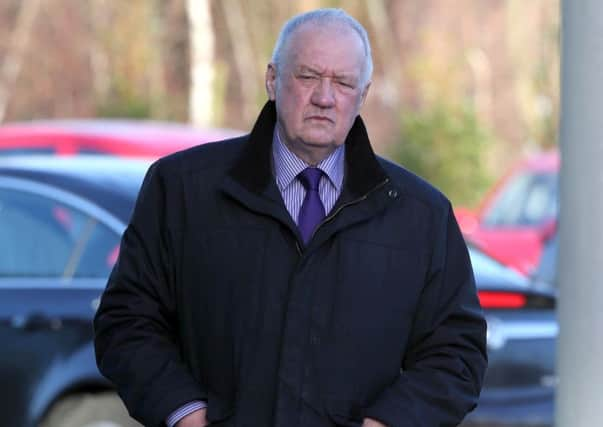Why Hillsborough police chief David Duckenfield could now face criminal charges


The jury in the Hillsborough inquests today returned a verdict that the 96 Liverpool fans were unlawfully killed.
In his instructions, coroner Sir John Goldring told them that to do so they would have to be sure that Duckenfield was
responsible for their manslaughter by gross negligence.
Advertisement
Hide AdAdvertisement
Hide AdAdvertisement
Hide AdAdvertisement
Hide AdThe jury had to answer four key questions before they could reach the crucial verdict.
Firstly, that as match commander, Mr Duckenfield owed a duty of care to the 96 who died.
Secondly, that he was in breach of that duty of care.
Thirdly, they must be sure that the breach of Mr Duckenfield’s duty of care caused the deaths.
Finally, the jury must be sure that the breach which caused the deaths amounted to “gross negligence.”
Advertisement
Hide AdAdvertisement
Hide AdUnless they are sure on all the four questions they should not conclude the fans were unlawfully killed, jurors were told.
During the inquests, Mr Duckenfield, who was in charge of policing during the FA Cup Semi Final at Hillsborough, apologised “unreservedly” to the families of Hillsborough victims after he admitted lying about the cause of the tragedy.
The former chief superintendent said he “deeply regretted” not telling FA chief executive Graham Kelly that it was his decision to open the exit gates at the stadium in the minutes before the fatal crush.
Mr Duckenfield, whose claim that Liverpool fans broke into the stadium, causing the disaster, spread around the world, was the subject of a private prosecution in 2000, when a jury failed to reach a verdict on a manslaughter charge.
Advertisement
Hide AdAdvertisement
Hide AdSince then, changes to the historic double jeopardy law, where a person cannot be tried twice for the same offence, mean a manslaughter prosecution can be brought when “compelling new evidence” comes to light.
During the private prosecution, Judge Mr Justice Hooper took the unprecedented decision before the case to tell Duckenfield and his co-defendant, Superintendent Bernard Murray, that they would not be jailed in any event.
The jury was discharged after failing to reach any verdicts against Duckenfield and the judge ordered proceedings against him to be “stayed”, or halted, after ruling out a retrial because he “would not receive a fair trial”.
Jon Stoddart, who leads the Operation Resolve investigation, said that if Mr Duckenfield were to be prosecuted the ‘stay’ imposed by the judge in 2000 would have to be lifted.
Advertisement
Hide AdAdvertisement
Hide AdIt is understood that in order to do this, prosecutors would have to go back to the original judge, or failing that another crown court circuit judge, to apply.
They could argue that the stay should be lifted as there is compelling new evidence in the case, though this would be subject to legal argument before a decision is made.
A husband and father, Mr Duckenfield and wife Ann have lived in rural Dorset for the past two decades, settling in a village outside Bournemouth, after leaving his 28-year police career behind. He did not appear to be at the bungalow in Ferndown as the verdicts were delivered.
He was first suspended from duty on August 4, 1989 after the interim Taylor Report and retired on medical grounds two years later, to avoid pending disciplinary hearings.
Advertisement
Hide AdAdvertisement
Hide AdHe left South Yorkshire Police aged 46, reportedly with a £23,000 a year index-linked pension, retiring to the south coast to a life of relative obscurity and golf.
His career had begun aged 16 in 1960, as a cadet, before being appointed a constable on September 2, 1963. He received three commendations in four years and was promoted to sergeant at the age of 25, moving into CID and then on to the regional crime squad.
Mr Duckenfield became a Freemason in 1975, becoming the Worshipful Master of his local lodge.
He also steadily rose up the police ranks, made an inspector in 1974, chief inspector in 1977, superintendent in 1983 and chief superintendent on March 27, 1989 - three weeks before the disaster.
Advertisement
Hide AdAdvertisement
Hide AdHis promotion “out of the blue” to command F Division came in somewhat unusual circumstances.
Chief Supt Bob Mole, his predecessor, was shunted sideways because of some ill-discipline in the division.
As Hillsborough was in F division, it became Mr Duckenfield’s responsibility and he was confident he could do the job.
His knowledge of the stadium was “basic” and his experience of football policing severely limited.
Advertisement
Hide AdAdvertisement
Hide AdThe new boss had just 15 working days to familiarise himself with his new role, a “serious mistake” he admitted later.
As police lost control at the turnstiles, the man at the top “froze”, overcome by the sheer enormity of the situation they had got into.
Within minutes he told a “terrible lie” that fans “got in through gates” or “stormed” them - not that he ordered them opened.
The lie blaming the fans was on the airways and halfway around the world moments later; the truth would take more than two decades to catch up.
Advertisement
Hide AdAdvertisement
Hide AdMr Duckenfield went into denial at the enormity of his blunders, had difficulty sleeping and drank too much.
He said: “I clearly recall leading up to Lord Justice Taylor’s inquiry sitting in an armchair one morning when the sun was coming through the window and I was drinking half tumblers of whisky to find the courage to read the statements and that continued.”
Forced to “bury the bad to survive” he could not even bear to hear the word Hillsborough.
With the assistance of doctors he made progress, and said had come to terms with reality as he apologised to the families.
Their lawyers told him his words now were “too little, too late”.